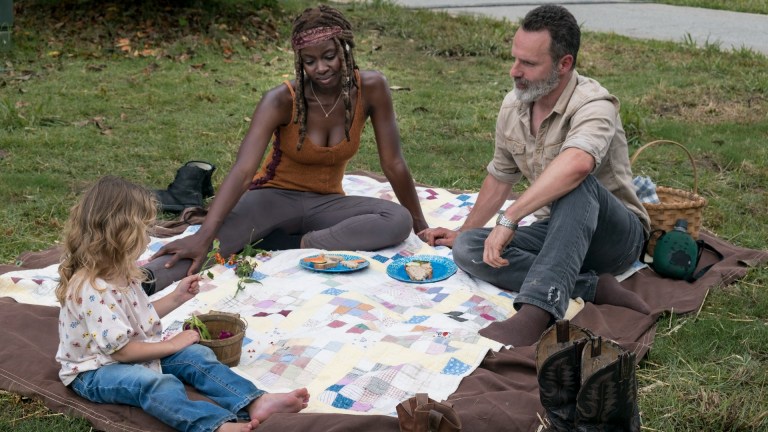The Walking Dead: Rick and Michonne’s Comic History Signals Tragic End for Series
With Rick and Michonne set to return for a Walking Dead spinoff, we look to the comics to see how their stories could really end.

This article contains spoilers for The Walking Dead comic.
“We’re the ones who live,” said Rick Grimes at the conclusion of The Walking Dead’s final season, a coda scene doubling as a preview for the currently untitled Rick and Michonne spinoff series. The words are repeated throughout a montage by many former cast members, living and dead, in an impactful close to the series.
This is a phrase familiar to fans, having been part of Rick’s distraught speech after a fistfight in the streets of Alexandria in the fifth season episode “Try,” then repeated by Michonne in the seventh season episode “Rock in the Road.” Its meaning changes meaning every time it’s spoken, originally a claim that Rick’s group knows more about survival than those calling the shots in Alexandria, then meant to bring Rick back to himself when spoken by Michonne. In this final episode, “We’re the ones who live” means “We’re the ones who fought to survive.”
In the comics, however, we’ve already said farewell to both Rick Grimes and a character who is fairly similar to Michonne. Will the Rick and Michonne series conclude their story? Time will tell, but, as always, we’re looking to the comics for clues.
Days Gone Bye
The Walking Dead is perhaps the outlet for which the concept of a zombie apocalypse received the most space to tell of “what happens next.” With the show clocking in at 177 episodes and the comic at 193 issues, both with spinoffs besides, this is a series that had nothing if not the space to roam. Yet, much of the story is told through the eyes of RIck Grimes, who undergoes an agonizing series of failures and successes before he eventually becomes a true man of the people.
In the comics, his death occurred between issues 191 and 192 when he refused to back down to Sebastian Milton, a vicious young man born into power via his status as the son of the Commonwealth’s leader, Pamela Milton. On TV, Rick had a similarly heroic end as he departed the series in season 9, drawing an inescapable horde of zombies away from his loved ones. When we last saw him, he was being carried away in a helicopter. In the final episode of The Walking Dead, RIck returns, though not in the capacity most fans expected, caked with mud and attempting to escape who we guess to be the military organization, the CRM.
For Michonne, the show-to-comics comparison is a bit rockier. The comic character of Andrea, who appears in the early seasons of the series, more or less fills the story beats that are Michonne’s in the show, while Michonne herself is a former lawyer who becomes one again in the Commonwealth, more like Yumiko of the TV series’ final seasons. In the coda, Michonne is in search of Rick, long believed dead. She has left her home and their children, knowing in her heart that he needs her help. She writes him letters, not knowing if they’ll ever be read.
The two of them are alone, separated by fate, but both of them are reaching out to each other. The Rick and Michonne series promises to give them the spotlight in ways that the show, long since becoming an ensemble with various pieces on the board more than the story of two people against the world, no longer would have been able to. Giving them the focus will be a treat for longtime fans who have watched their story unfold over several seasons, but as they are separated from the loved ones that had their back through it all, their lives are in greater peril than ever before. Will they survive? Their comic book selves…didn’t.
“We’re the ones who live.” But survival isn’t what matters. It’s hope.
Love in the Time of Zombies
Much as with Michonne on the show, comic book Andrea falls in love with Rick in no small part because of his way of ensuring that the group survives, no matter what it costs him personally. In either medium, these characters are able to see the toll that this survival takes on Rick. Each of them is the great love of his post-zombie life as well as his strongest ally, showing the same dedication to the community that he does. They love him not only as a man but also as an idea.
Perhaps most notably either way, their relationship becomes the most strained when Negan viciously murders Glenn. Andrea and Michonne both struggle with seeing Rick robbed of his spirit, and, over time, rally him to take Negan on once more. A Rick that doesn’t stand up for what’s right isn’t Rick at all, they know. Indeed, for much of either series, Rick teeters on the line between benevolence, barbarism, and despair. His partnership with Andrea/Michonne, long before it becomes romantic, is a big part of what helps him keep his head above water.
Andrea never makes it to the Commonwealth. She’s bitten when the villainous Alpha and her Whisperers unleash a massive walker horde on Alexandria. As she dies, Rick weeps, telling her he can’t do it without her, but Andrea knows that he can. She dies with him by her side, and it nearly breaks him. The weight of bearing so much without his partner is shattering, and he’s unable to stab her to prevent her from turning until after she attacks and nearly kills him. Rick wants to die, but he has to move on.
“We’re the ones who live.” Until we don’t.
Let the Commonwealth Go
Rick’s death in the comics is easily explained as a simple act of violence, with the spoiled Sebastian acting out in anger because Rick refused to toe the party line and instead caused a revolution in the Commonwealth. Yet, it wouldn’t be The Walking Dead if there wasn’t a larger commentary at play. Much like the TV show, by the time he makes it to the Commonwealth, Rick has killed countless people, made endless mistakes, and said goodbye to most of his loved ones under some of the most unbelievable circumstances possible. Amidst all of that, this is where he finally becomes who he always wanted to be.
Rick is a deeply flawed man from day one, but the last time we see him, he’s better than he’s ever been. His great act of leadership in the Commonwealth was not to fight to the top but to issue a plea that the people rise up, not to embrace a leader, but to lead themselves. For an ex-cop with an incalculable death toll under his belt, who we have regularly felt had passed the line of no return, this is shockingly progressive, but it’s also the story being told from the very beginning.
If you don’t agree with Rick every step of the way through his bloody journey in The Walking Dead, the fact is, you’re not supposed to. Rick, in his final moments on the page, very likely wouldn’t have agreed with the version of him we met in “Days Gone Bye.” Through blood and guts and pain, this is who Rick becomes. Even in death, he lives, as he is lifted into near-martyrdom by the people he didn’t liberate, but who he asked to liberate themselves.
“We’re the ones who live.” The way we live matters. The choices we make matter.
Where We Are Now
In comics, Rick’s story reaches its inevitable conclusion as part of the endgame its creative team was working toward from the beginning. In reality, production for The Walking Dead takes months to film in Atlanta, and with Andrew Lincoln’s family located in London, the distance eventually spurred the actor to leave the series. It’s very possible that this will be the last run for Rick, for more reasons than simply narrative purposes.
With recent photos from the production having leaked, we know that Rick and Michonne find each other after all, but the circumstances remain a mystery. Showrunner Scott Gimple has indicated that the series will take them to never-seen-before places in The Walking Dead universe, but for now, we don’t know much more than that.
Rumors about the Rick-based film have come and gone often over the last several years. In many ways, the first episodes of The Walking Dead actually constitute a Rick-focused film, told episodically but very much centered on his journey. Over time, the franchise has blown up into not just a thriving cast of unique characters in its own right, but enough to fill out several spin-offs that will likely see no appearance from Rick or Michonne at all. In some ways, The Walking Dead has moved on, and in others, it will never move on, and that’s just what it’s like when a chapter of your life closes.
The way the franchise has moved with and away from Rick and Michonne as its center is part of the beauty of the story. Since his departure in the ninth season, Rick’s narrative has shifted away from a leader to being simply a man, alone and trying to survive in a hostile world, thinking of those he lost and still loving them so much that they haunt his every waking moment. It is a gift to be haunted by those we love. It’s how we keep them with us when they can’t be here anymore.
If this series is the end of Rick and Michonne, and if we’re to finally say goodbye to them after this incredible journey as we’ve already said goodbye to them in the comics, then it would be hard to say that it wasn’t earned. With the Whisperers and the Miltons long since out of the way, it’s impossible for their stories to conclude according to the original arcs. Yet, it’s the spirit of things that matters, and these two characters have always had that part on lock.
“We’re the ones who live.” We’re the ones who live on.
